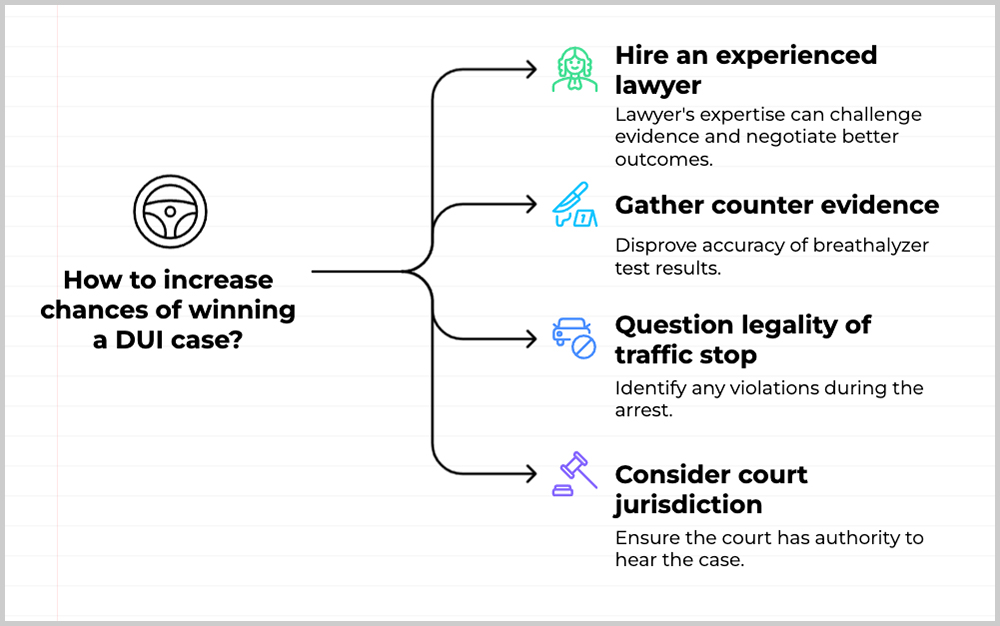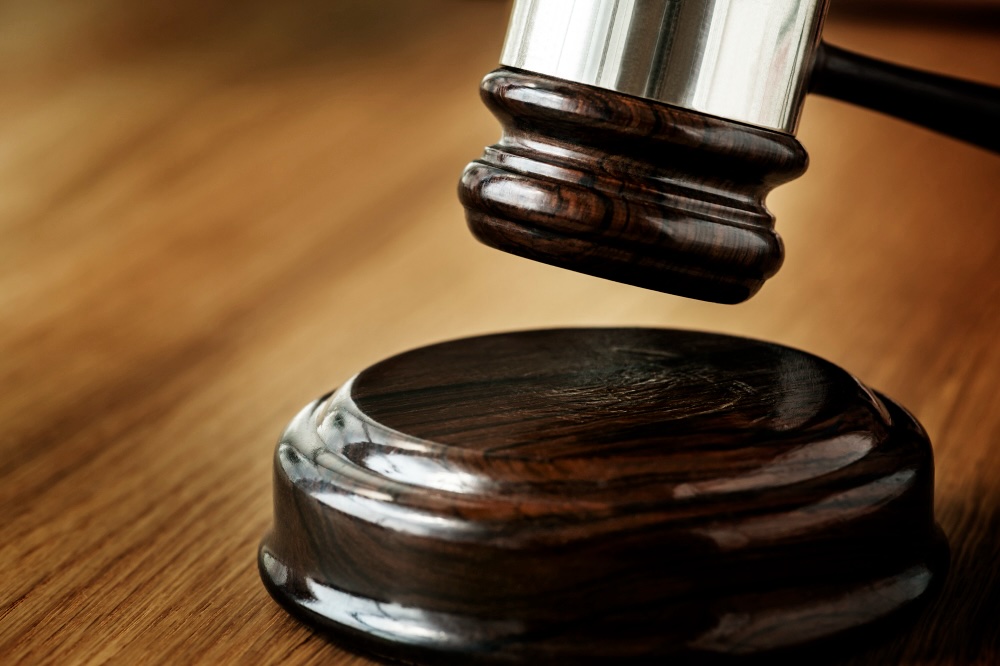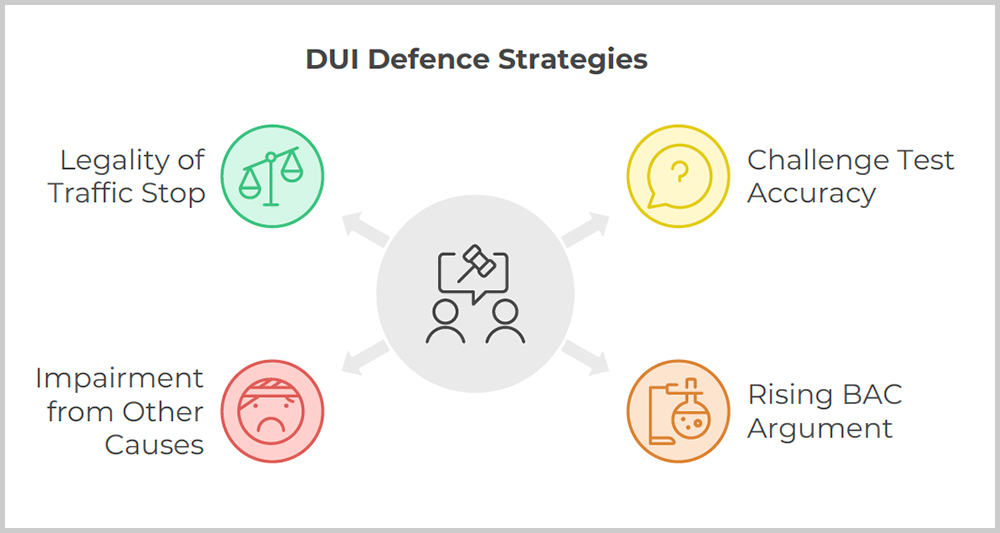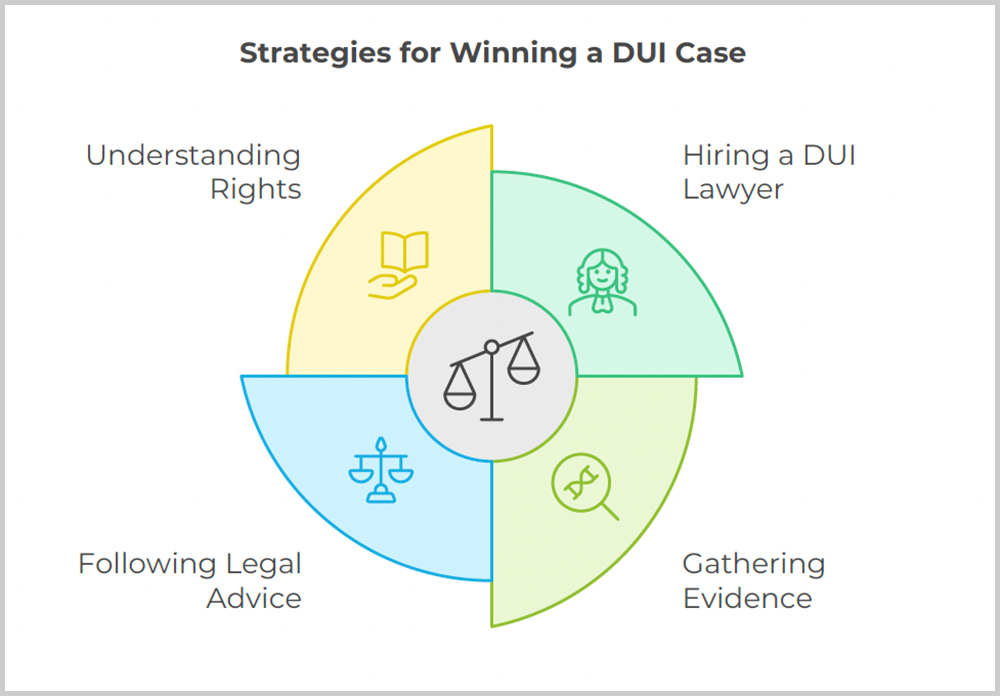Chances of Winning a DUI Case in Ontario
Last Updated: September 23, 2024
The potential consequences of a DUI conviction in Ontario are severe and far-reaching.
As per Section 320.19 of the Criminal Code, penalties can include fines of at least $1000 for a first offence, mandatory driving prohibitions, and imprisonment for repeat offenders.
Additionally, under Ontario’s Highway Traffic Act, convicted drivers face immediate license suspensions, mandatory education or treatment programs, and the requirement to install an ignition interlock device.
Given these severe repercussions, understanding the likelihood of a favourable outcome in a DUI case is crucial for anyone facing such charges.
The chances of beating a DUI charge in Ontario can vary significantly depending on numerous factors, including the strength of evidence, police conduct, and the specific circumstances of the arrest.
By comprehending the potential outcomes and the factors that influence them, individuals can make more informed decisions about their defence strategy.
Factors That Affect the Chances of Winning a DUI Case

Several key factors can significantly influence DUI case success rates in Ontario. The strength of evidence against you is crucial, including Blood Alcohol Concentration (BAC) levels and sobriety test results.
BAC levels close to the legal limit may provide more room for challenge, while clear evidence of intoxication strengthens the prosecution’s case. Dashcam or bodycam footage can either support or contradict the officer’s account, making it a critical piece of evidence.
Police conduct and procedure also play a vital role. The legality of the traffic stop is paramount; if the officer lacked reasonable grounds for the stop, subsequent evidence may be inadmissible.
Proper administration of breathalyzer and sobriety tests is also essential. Any procedural errors in these tests can weaken the prosecution’s case.
Lastly, the presence of rights violations under the Canadian Charter of Rights and Freedoms can significantly impact the case. This includes unlawful search or detention, failure to inform the accused of their right to counsel, or unreasonable delays in allowing the accused to contact a lawyer. Such violations can lead to the exclusion of evidence or even the dismissal of charges, substantially increasing the chances of a favourable outcome for the accused.

Common DUI Defences Used in Ontario

In Ontario, several common defences are frequently employed in DUI cases. One primary strategy is challenging the legality of the traffic stop. If it can be proven that the officer lacked reasonable suspicion to initiate the stop, any evidence gathered thereafter may be deemed inadmissible, potentially leading to case dismissal.
Another effective defence involves questioning the reliability of testing equipment. Breathalyzers require regular calibration and maintenance. If records indicate improper calibration or maintenance, the accuracy of BAC readings can be contested, potentially weakening the prosecution’s case.
Medical conditions can also play a significant role in DUI defences. For instance, gastroesophageal reflux disease (GERD) can cause the regurgitation of alcohol from the stomach, potentially leading to artificially high BAC readings. Presenting medical evidence of such conditions can cast doubt on the validity of breathalyzer results.
Lastly, the accuracy of field sobriety tests is often challenged. These tests can be unreliable due to various external factors such as adverse weather conditions, uneven road surfaces, or the individual’s physical limitations unrelated to intoxication. Demonstrating how these factors could have affected test performance can undermine the prosecution’s evidence of impairment.
These defences, when skillfully applied, can significantly increase the likelihood of winning a DUI case in Ontario.
Statistics on DUI Case Outcomes in Ontario
Based on the Statistics Canada data for impaired driving cases in Ontario for 2020-2021:
Percentage of cases dismissed, or charges reduced:
- 60% of cases were stayed or withdrawn, which includes dismissals and discharges at the preliminary inquiry as well as court referrals to alternative measures and restorative justice programs. These decisions all refer to the court stopping criminal proceedings against the accused.; and
- 37% of cases had outcomes of guilty, which includes guilty of the charged offence, of an included offence, of an attempt of the charged offence, or of an attempt of an included offence. This category also includes guilty pleas and cases where an absolute or conditional discharge has been imposed.
Overall, these figures suggest that the outcomes of DUI cases in Ontario are far from certain, and there’s a significant chance of achieving a favourable result if the case is properly defended.
Role of an Experienced DUI Lawyer
An experienced DUI lawyer plays a crucial role in navigating the complexities of Ontario’s DUI laws and maximizing the chances of a favourable outcome. Their in-depth knowledge of Ontario-specific DUI regulations allows them to identify potential weaknesses in the prosecution’s case and develop effective defence strategies tailored to local legal nuances.
A seasoned DUI lawyer brings a track record of success in similar cases, having dealt with various scenarios and defence strategies. This experience enables them to anticipate prosecution tactics, negotiate effectively with prosecutors, and make informed decisions about whether to pursue a plea bargain or go to trial.
One of the most valuable assets an experienced DUI lawyer offers is their network of expert witnesses.
These can include medical professionals who can testify about conditions that might affect BAC readings, technical experts who can challenge the reliability of testing equipment, and toxicologists who can provide alternative interpretations of BAC results.
The strategic use of these experts can significantly strengthen the defence by introducing reasonable doubt or challenging the accuracy of evidence.
Furthermore, an experienced lawyer can navigate the administrative aspects of a DUI charge, such as license suspension hearings, and provide guidance on minimizing the long-term consequences of a DUI charge on their client’s personal and professional life.

Plea Bargains and Alternative Outcomes
Plea bargains play a significant role in the resolution of DUI cases in Ontario.
The primary goal of a plea bargain is to secure a conviction while offering the accused a more lenient sentence or reduced charges.
Alternatives to a full DUI conviction are often part of these plea bargains. One common alternative is pleading guilty to careless driving under the Highway Traffic Act instead of the Criminal Code offence of impaired driving.
This option carries fewer penalties than a DUI conviction and does not result in a criminal record, though it still involves fines and potential license suspension. Other alternatives may include reduced fines, shorter license suspension periods, or in some cases, diversion programs for first-time offenders. These programs typically involve substance abuse education, community service, and a period of probation. Upon successful completion, charges may be withdrawn or reduced.
It’s important to note that the availability of these alternatives often depends on factors such as the severity of the offence, the accused’s prior record, and the specific circumstances of the case.
Experienced legal counsel can play a crucial role in negotiating these plea bargains and alternative outcomes, potentially mitigating the severe consequences of a full DUI conviction while still addressing the underlying offence.
Tips to Improve Your Chances of Winning

To improve your chances of winning a DUI case in Ontario, it’s crucial to act swiftly and strategically. First and foremost, consult a lawyer as soon as possible after the incident. Early legal intervention can help preserve evidence and protect your rights from the outset.
Secondly, document everything related to your case. Take detailed notes about the incident, including the events leading up to the traffic stop, the interaction with police, and any tests administered. Record times, locations, and specific statements made by officers. This information can be invaluable to your defence.
Lastly, exercise your right to remain silent. Avoid discussing the case with anyone other than your lawyer. Statements made to friends, family, or on social media can potentially be used against you. Let your lawyer handle all communications related to your case.
By following these tips, you can strengthen your defence and increase the likelihood of a favorable outcome in your DUI case.
Final Thoughts
In conclusion, the importance of evaluating your DUI case early cannot be overstated. The complexities of DUI laws in Ontario, combined with the potentially severe consequences of a conviction, make it crucial to assess your situation promptly and thoroughly.
Early evaluation allows for the preservation of critical evidence, the identification of potential defence strategies, and the timely protection of your rights.
The role of a skilled DUI lawyer in increasing the chances of a favorable outcome is paramount. An experienced attorney brings a wealth of knowledge about Ontario’s DUI laws, local court procedures, and effective defence strategies. They can navigate the intricacies of your case, from challenging evidence and negotiating plea bargains to representing you effectively in court if necessary.
A proficient DUI lawyer not only understands the legal aspects but also the personal implications of a DUI charge. They can guide you through the process, helping to mitigate the impact on your life, career, and future. Their expertise can be the difference between a conviction with severe consequences and a more favorable resolution.
Remember, while facing a DUI charge is daunting, with the right approach and skilled legal representation, you can significantly improve your chances of achieving the best possible outcome in your case. Don’t underestimate the value of professional legal counsel in protecting your rights and your future when facing DUI charges in Ontario.
Get A Free Consultation
"*" indicates required fields



